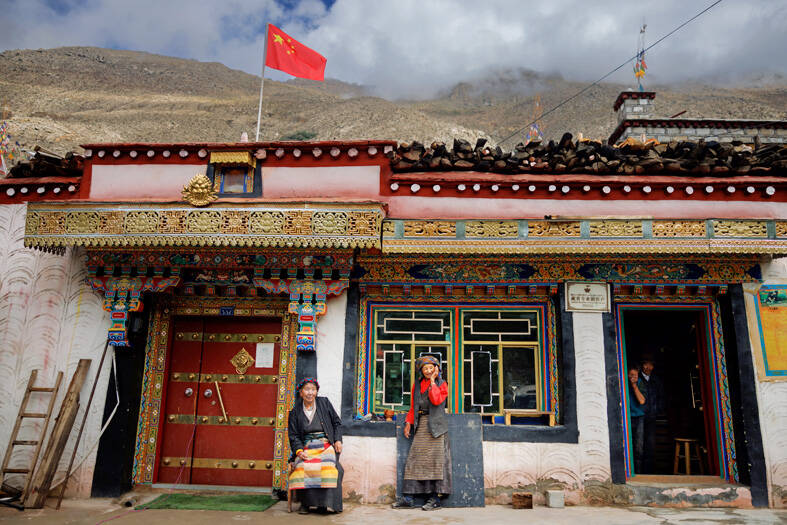China’s booming electric vehicle (EV) industry is fueling a lithium rush in the Tibetan Plateau that risks damaging the troubled region’s fragile ecology and deepening rights violations, research published yesterday said.
China is the world’s biggest EV market, but largely relies on other countries to supply the lithium used in the batteries that power low-carbon vehicles.
That is set to change as Beijing begins to exploit vast deposits on the Tibetan Plateau — about 85 percent of the country’s total lithium reserves.

Photo: EPA-EFE
This “white gold rush” has led to Chinese miners polluting the local environment with “quick, cheap and dirty” extraction and processing techniques, according to the report by Turquoise Roof, a network of Tibetan researchers.
The group used satellite data and public resources to chart the effects of lithium mining in culturally Tibetan areas and its links to automakers, including Elon Musk’s Tesla and its Chinese competitor BYD.
Those firms are “increasingly reliant on Tibet’s lithium exploitation,” it said.
“Bigger, faster electric cars require larger capacity lithium batteries — which cannot be done without a hidden footprint in Tibet,” it said.
Citing Chinese geological research, Turquoise Roof said that about 3.6 million tonnes of China’s lithium lies in hard rock deposits in Tibet and the adjacent provinces of Sichuan and Qinghai.
Miners exploiting those resources risk creating “devastating” pollution in biodiverse regions particularly vulnerable to climate change, the report says.
It pointed to a mine in Sichuan whose activities reportedly killed thousands of fish in a local river and harmed grasslands home to Tibetan herders.
“Tibetans have no voice in this latest rush to riches ... there can be no informed local consideration of whether there should be extraction,” it says.
In one example, the report cites a patch of land in a Tibetan autonomous county in Sichuan Province found to have rich lithium deposits that sparked a bidding war between firms, eventually won by Chinese battery giant Contemporary Amperex Technology Co.
However, local Tibetans “were not informed that their hill pastures were being sold, let alone consulted in any way about the land being drilled beneath their feet,” it said.
China says it has brought infrastructure and education since taking over the region in 1951, but many exiled Tibetans accused the Chinese Communist Party of repression, torture and eroding their culture, with rights groups and some Western governments backing their claims.
About 1 million Tibetan children have been separated from their families and put through “forced assimilation” at Chinese residential schools, UN experts have said.
Yesterday’s report comes as China seeks to shore up domestic supplies of critical minerals in the face of fraying ties with Western exporters.
Beijing imposed curbs on the graphite used to make EV batteries after the US restricted outflows of high-tech microchips to China.
The EU has also angered China by launching a probe into Beijing’s subsidies for its homegrown EVs.

Tens of thousands of Filipino Catholics yesterday twirled white cloths and chanted “Viva, viva,” as a centuries-old statue of Jesus Christ was paraded through the streets of Manila in the nation’s biggest annual religious event. The day-long procession began before dawn, with barefoot volunteers pulling the heavy carriage through narrow streets where the devout waited in hopes of touching the icon, believed to hold miraculous powers. Thousands of police were deployed to manage crowds that officials believe could number in the millions by the time the statue reaches its home in central Manila’s Quiapo church around midnight. More than 800 people had sought

DENIAL: Pyongyang said a South Korean drone filmed unspecified areas in a North Korean border town, but Seoul said it did not operate drones on the dates it cited North Korea’s military accused South Korea of flying drones across the border between the nations this week, yesterday warning that the South would face consequences for its “unpardonable hysteria.” Seoul quickly denied the accusation, but the development is likely to further dim prospects for its efforts to restore ties with Pyongyang. North Korean forces used special electronic warfare assets on Sunday to bring down a South Korean drone flying over North Korea’s border town. The drone was equipped with two cameras that filmed unspecified areas, the General Staff of the North Korean People’s Army said in a statement. South Korea infiltrated another drone

COMMUNIST ALIGNMENT: To Lam wants to combine party chief and state presidency roles, with the decision resting on the election of 200 new party delegates next week Communist Party of Vietnam General Secretary To Lam is seeking to combine his party role with the state presidency, officials said, in a move that would align Vietnam’s political structure more closely to China’s, where President Xi Jinping (習近平) heads the party and state. Next week about 1,600 delegates are to gather in Hanoi to commence a week-long communist party congress, held every five years to select new leaders and set policy goals for the single-party state. Lam, 68, bade for both top positions at a party meeting last month, seeking initial party approval ahead of the congress, three people briefed by

Cambodia’s government on Wednesday said that it had arrested and extradited to China a tycoon who has been accused of running a huge online scam operation. The Cambodian Ministry of the Interior said that Prince Holding Group chairman Chen Zhi (陳志) and two other Chinese citizens were arrested and extradited on Tuesday at the request of Chinese authorities. Chen formerly had dual nationality, but his Cambodian citizenship was revoked last month, the ministry said. US prosecutors in October last year brought conspiracy charges against Chen, alleging that he had been the mastermind behind a multinational cyberfraud network, used his other businesses to launder